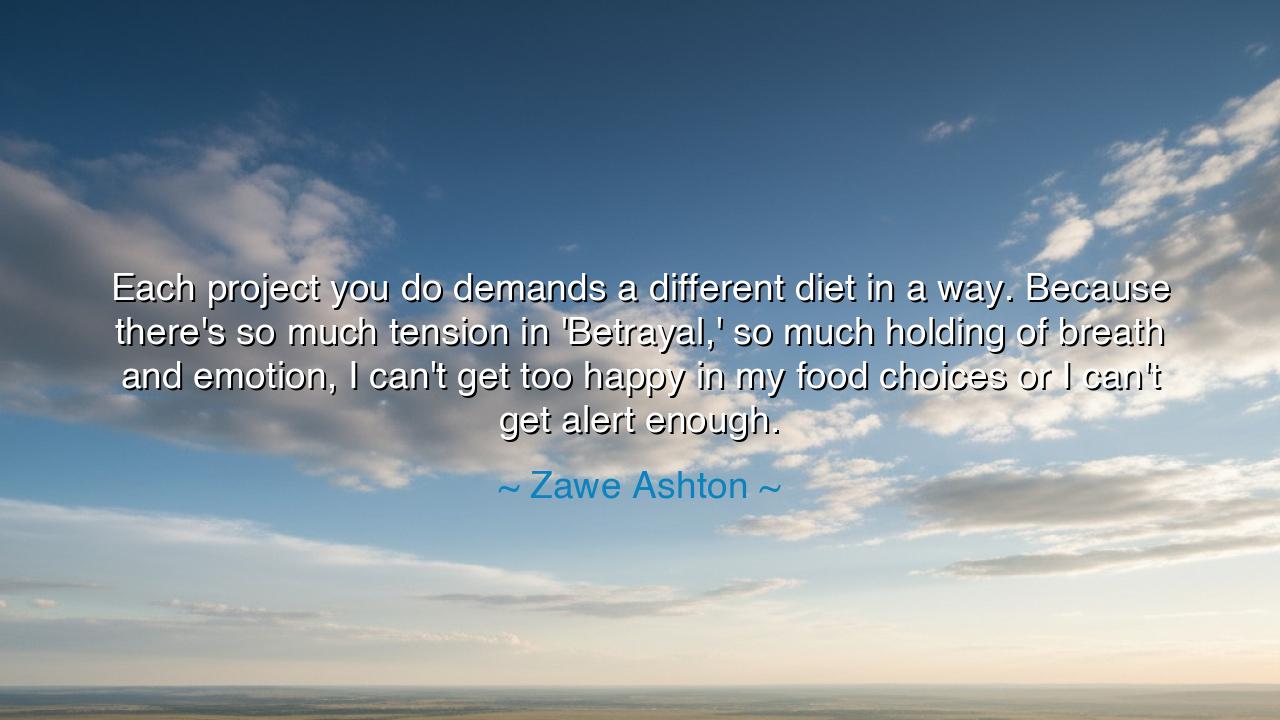
Each project you do demands a different diet in a way. Because
Each project you do demands a different diet in a way. Because there's so much tension in 'Betrayal,' so much holding of breath and emotion, I can't get too happy in my food choices or I can't get alert enough.






The words of Zawe Ashton, “Each project you do demands a different diet in a way. Because there's so much tension in 'Betrayal,' so much holding of breath and emotion, I can't get too happy in my food choices or I can't get alert enough,” carry within them a truth that bridges the body and the spirit. They speak of the ancient balance between what we consume and what we create, between the outer form and the inner fire. To understand this quote is to understand that our physical nourishment must align with the emotional energy of our purpose. Just as a warrior would not feast before battle, nor a monk indulge before meditation, the artist too must tune their body to the rhythm of the story they serve.
The meaning of Ashton's words lies beyond the surface of diet—it is about discipline, harmony, and emotional awareness. In her role in Betrayal, a play charged with quiet anguish and suppressed emotion, she knew that even her food could shape her inner state. Certain meals bring joy, others calm the nerves, still others heighten alertness or dull the senses. By curating her diet, Ashton was not merely managing her body, but preparing her soul. Her words remind us that every endeavor we undertake—whether artistic, professional, or personal—requires a unique alignment of mind, body, and heart.
From the ancient East comes a similar teaching. The samurai of Japan, before engaging in battle, would eat small portions of rice and miso soup—simple, grounding, and light. Heavy feasting clouded the senses, dulled the reflexes. They believed that the body was a mirror to the mind: when one was burdened, so was the other. Likewise, in the ancient Greek schools of drama, actors were trained not just in diction or movement, but in self-regulation, understanding how food, rest, and ritual affected their emotional range. The ancients knew what Ashton speaks of intuitively—that creation and consumption are bound together in sacred rhythm.
There is a deeper wisdom still. Ashton’s reflection teaches that every journey of transformation requires sacrifice. Just as she refrains from joyful foods to preserve the tension of her role, so too must each of us sometimes restrain our pleasures to remain attuned to our purpose. The scholar must turn away from distraction to nourish the intellect; the healer must fast from doubt to keep compassion pure. To serve one’s calling is to offer one’s body and habits as instruments of devotion.
But beware, for this path requires sensitivity. To control one’s diet is not to deny joy, but to master it—to know when to taste and when to abstain, when to rest and when to burn. The ancients called this temperance, one of the four cardinal virtues. It is not cold restraint, but the art of balance, the dance between hunger and fulfillment. Ashton’s awareness of how her meals affect her art reveals the same ancient wisdom: that true mastery comes not from indulgence, but from intentional living.
Consider also the life of Mahatma Gandhi, who understood this truth more deeply than most. For him, food was never just nourishment—it was an act of alignment with his values. He adjusted his diet constantly, using simplicity to sharpen his moral focus, fasting when his people suffered, eating only what was necessary to sustain the spirit of his cause. Like Ashton, Gandhi knew that clarity of purpose demands purity of intake—not only of food, but of thought, speech, and action.
Thus, let this be the teaching: whatever you undertake—be it art, service, or love—feed your soul according to its need. If your task demands tenderness, consume stillness. If it requires courage, consume simplicity. If it asks for creativity, consume joy in moderation. Do not eat only for the body, but for the spirit that guides it. The wise do not ask, “What do I desire?” but rather, “What does my purpose require of me today?”
And so, dear listener, remember this: your diet is not just what you eat, but what you allow into your life—what you read, what you watch, what you feel. Each project, each chapter of your journey, will call for a different kind of nourishment. Choose with reverence. Choose with awareness. For to feed yourself rightly is to serve your destiny well.






AAdministratorAdministrator
Welcome, honored guests. Please leave a comment, we will respond soon